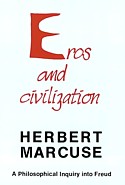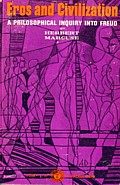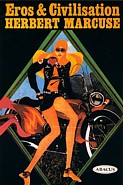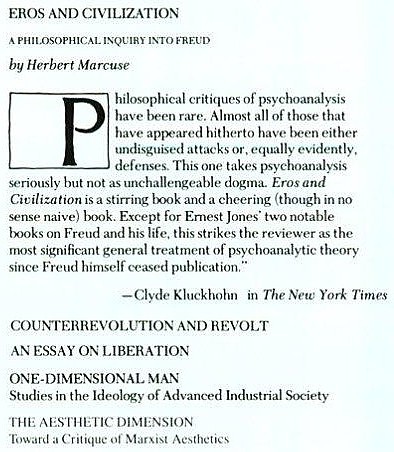| page
numbers in the chapters on this site are from the 1961 edition edition: |
1961 |
1966 |
| Political
Preface to the 1966 Edition |
|
xi |
| Preface |
vii |
xxvii |
| Introduction |
3 |
3 |
| Part
I: Under The Rule Of The Reality Principle |
|
|
- The
Hidden Trend in Psychoanalysis
Pleasure principle and reality principle
Genetic and individual repression
"Return of the repressed" in civilization
Civilization and want: rationalization of renunciation
"Remembrance of things past" as vehicle of liberation
|
11 |
11 |
- The Origin of the
Repressed Individual (Ontogenesis)
The mental apparatus a a dynamic union of
opposites
Stages in Freud's theory of instincts
Common conservative nature of primary instincts
Possible supremacy of Nirvana principle
Id, ego, superego
"Corporealization" of the psyche
Reactionary character of superego
Evaluation of Freud's basic conception
Analysis of the interpretation of history in Freud's psychology
Distinction between repression and "surplus-repression"
Alienated labor and the performance principle
Organization of sexuality: taboos on pleasure
Organization of destruction instincts
Fatal dialectic of civilization
|
20 |
21 |
- The Origin of Repressive Civilization (Phylogenesis)
"Archaic heritage" of the individual ego
Individual and group psychology
The primal horde: rebellion and restoration of domination
Dual content of the sense of guilt
Return of the repressed in religion
The failure of revolution
Changes in father-images and mother-images
|
50 |
55 |
- The Dialectic of Civilization
Need for strengthened defense against destruction
Civilization's demand for sublimation (desexualization)
Weakening of Eros (life instinct); release of destructiveness
Progress in productivity
and
progress in domination
Intensified controls in industrial civilization
Decline of struggle with the father
Depersonalization of superego, shrinking of ego
Completion of alienation
Disintegration of the established reality principle
|
71 |
78 |
- Philosophical Interlude
Freud's theory of civilization in the tradition
of Western philosophy
Ego as aggressive and transcending subject
Logos as logic of domination
Philosophical protest against logic of domination
Being and becoming: permanence versus transcendence
The eternal return in Aristotle, Hegel, Nietzsche
Eros as essence of being
|
96 |
106 |
| Part
2: Beyond the Reality Principle |
|
|
- The Historical Limits of the Established Reality Principle
Obsolescence of scarcity and domination
Hypothesis of a new reality principle
The instinctual dynamic toward non-repressive civilization
Problem of verifying the hypothesis
|
117 |
129 |
- Phantasy and Utopia
Phantasy versus reason
Preservation of the "archaic past"
Truth value of phantasy
The image of life without repression and anxiety
Possibility of real freedom in a mature civilization
Need for a redefinition of progress
|
127 |
140 |
- The Images of Orpheus and Narcissus
Archetypes of human existence under non-repressive
civilization
Orpheus and Narcissus versus Prometheus
Mythological struggle of Eros against the tyranny of reason--against
death
Reconciliation of man and nature in sensuous culture
|
144 |
159 |
- The Aesthetic Dimension
Aesthetics as the science of sensuousness
Reconciliation between pleasure and freedom, instinct and morality
Aesthetic theories of Baumgarten, Kant, and Schiller
Elements of a non-repressive culture
Transformation of work into play
|
157 |
172 |
- The Transformation of Sexuality into Eros
The abolition of domination
Effect on the sex instincts
"Self-sublimation" of sexuality into Eros
Repressive versus free sublimation
Emergence of non-repressive societal relationships
Work as the free play of human faculties
Possibility of libidinous work relations
|
180 |
197 |
- Eros and Thanatos
The new idea of reason: rationality of gratification
Libidinous morality
The struggle against the flux of time
Change in the relation between Eros and death instinct
|
203 |
232 |
| Epilogue:
Critique of Neo-Freudian Revisionism (with
footnotes) |
217 |
238 |
| Index
[images from 1966/2000 edition; not for this one,
so page numbers are a bit off] |
253 |
275 |






